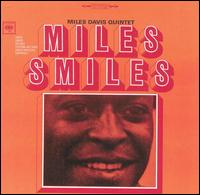 Miles Davis Miles Davis's mid-60s quintet may or may not be the very best band he assembled – the Kind of Blue line-up is a pretty g'damn staggering grouping of amazingly creative artists, the conglomeration of which is as rare as whatever type of eclipse is rare. And loads of snooty snootster jazz purists argue that Miles' mid-50s quintet was stronger than any of 'em. But for pure excitement, this group just cannot be beat: Drummer Tony Williams and pianist Herbie Hancock were still fresh on the scene, brimming with energy and excitement, though they already had the benefit of some years of experience recording for Blue Note behind them; bassist Ron Carter and saxophonist Wayne Shorter added a more seasoned approach, with Shorter right off a stint with Art Blakey's Jazz Messengers and just coming into his own as a composer. Add Miles and what was perhaps an even greater talent of his than the g'damn fantastic trumpet playing: the uncanny ability to inspire amazing playing from essentially anyone who ever played with him. The members of the 60s quintet are all among the very best jazz has ever offered, and when they really get down to business and everything gels, the result is truly about as good as any music gets: tight, exciting, beautiful, challenging, and transcendent. Miles Smiles is the album where these virtues are witnessed in full glory. It's six songs of perfection, distilling all of the facets of its players into the perfect brew, highly enjoyable and very deep at the same time. It's the perfect bridge between the sensibilities of Kind of Blue and In a Silent Way, and should really be held in the same high regard as both of those signposts. In fact, for my money, only Kind of Blue can surpass it. Mid-60s jazz too often gets passed over when people make sweeping judgments on "importance," and given the sheer quantity of stellar recordings made in that time period, the oversight is kinda shocking to us non-snootster young'uns. Miles was pushing boundaries with this group, John Coltrane was putting together a galvanizing and revolutionary body of work with his quartet, and relatively lesser-known, but incredibly consistent, artists like Bobby Hutcherson and Lee Morgan were putting out music of a blissful grace that is arguably the best of all. Miles and his bands were never infallible, of course. But when they were on they were on. The recording of Miles Smiles can be compared to that of Kind of Blue in that everything was played first take. If Miles didn't like what he was hearing thirty seconds into a song, he cut everyone off and they started over. Maybe it was this sense of urgency that propelled everyone to such great heights. In any event it's astonishing imagining this caliber of expression occurring under such pressured circumstances. Everything on Miles Smiles sounds perfectly realized, and also incredibly fresh. In the shadow of the 60s quintet, most rock bands sound like flailing and idiotic lunkheads – There's more beauty and more excitement here than a band like, say, U2 could ever muster, to say nothing bands on the pitiful level of, like, Staind. So, as to the music, what do we have here? "Orbits" opens with a propulsive bang. It's one of three Shorter compositions here; he was the group's most innovative composer and it shows. His stuff is exploring yet accessible. Miles and Shorter open with the melody, and Tony Williams (who was only freaking 20 years old at the time) immediately takes the reins. Miles's sound throughout is unrestrained and joyful, and I can't think of any other Miles album where he sounds like he's having such a great time playing. I love it when he and Shorter play the same line together—they're never quite playing in perfect sync, making what might be a bit pat kind of ragged and gloriously exciting. As the song unfolds, Miles, Shorter, and Hancock take solos, the former two pushing things out and Hancock bringing things back toward the melody. Ron Carter is solid as a rock throughout, the perfect steady foil for the soloists and the incendiary drummer behind him. Miles's one composition on here is "Circle," in more of a mellow vein. Of all the songs on the album it sounds most bound to past jazz tradition, but that's in no way a bad thing given its sheer beauty. After an understated opening with muted trumpet, piano, and brushed snare, Hancock gradually steals the show, soloing away into places known and unknown. "Footprints" is a Shorter tune that sounds pleasingly familiar to me the first time you hear it. Carter lays the groundwork with a great bassline, and keeps things under control as the song builds in complexity and the solos stretch out. Shorter in particular charges through his part with great flair, and again Hancock brings an understated order back to things as the song comes to a close. "Dolores," also by Shorter, is in contrast pure balls-out stuff. From here on out, you're grabbed by the neck and shaken around until you're dizzy with pleasure. "Dolores" may be the least of these three closing gems, but that's holding it to quite a high standard – it may be a wee bit less memorable from a melodic standpoint, but it's damn exciting physically, especially at the end, where Miles and Shorter revisit the melody together one last time and Williams fills away like the fucking Tazmanian Devil. Honestly, I don't know how the guy played like that. This all just leads up to my two favorite tracks here, songs that truly transport me and assure that this will always be one of my favorite albums. Williams' dominance at the end of "Dolores" transfers straight into "Freedom Jazz Dance," an aptly titled Eddie Harris composition driven by Williams's deep, magnificent polyrhythms. I think magical might be the word here, but that word feels too hollow for the emotions this tune conjures. This one has the slightest taste of deep ominous funk, and it's no stretch to see it as an early indication of what was on the wind for Miles. "Freedom Jazz Dance" is truly another musical world, yet somehow the band tops it with "Gingerbread Boy." It's a huge adrenaline rush, a perfect crystallization of each player's strengths and taste. Miles and Shorter launch straight into the melody, almost giddily in fact, rushing headlong one second, then stopping briefly and jumpin' right back in again. Williams and Carter come to dominate, as evidenced by moments like Shorter's solo (and it's a hell of a solo), which practically sounds like it's in the background compared to the insistent rumble of the rhythm section. After seven-plus minutes of bliss I sure as hell don't want it to end, but when it does it's about as perfect you could want: the trumpet and sax hurtle back to restate the melody one last time, even stronger than before, then everyone drops out to let the drums and bass take the song off into some kind of twilit horizon. And then Miles' voice comes in, deep and gravelly, enigmatically muttering "Teo, Teo." It's a great, human way to close up the album. Miles Smiles may not have the universal acclaim that Kind of Blue has, but I must admit I'm more likely to throw it in the CD player at any given time. It just knocks me down and kicks my sorry ass. It's barely conceivable that merely two days in October 1966 went into Miles Smiles. The freshness of it is inspiring time and again. Transcendent is transcendent, dammit, and you're not likely to find much music better than this. I'm no pure acolyte, but g'damn if Miles did not make a whole lot of fucking great music.
Review by HIP |
